- Home
- Chris Pourteau
Susquehanna Page 2
Susquehanna Read online
Page 2
Hatch observed her demeanor. To anyone else, she had a subdued air about her, but he knew better. They’d been lovers once, and he knew her better than anyone else in the room. Her face was flat, a particular expression she wore when she focused in combat. But her right hand flexed and wiped ever so surreptitiously on her uniform. She was sweating. She was excited. Something was up.
“At ease,” said Neville, producing the superior air he always did when addressing his command. “Be seated, ladies and gentleman.”
After the scraping of chairs subsided, he put his hands behind his back.
“Who does he think he is, Montgomery?” whispered Stug to the air. “He needs a cheesy moustache—”
“Shhh.” Hatch wanted to hear what was incoming. If Mary was excited, he was excited. Some things never change, he thought, amusing himself.
“I assume you all had enough to eat this morning?” asked Neville slyly.
Some big grunt from the back took the bait. “Not really, sir.”
“Precisely why we’re here, soldier,” answered the colonel, stabbing at the air to make his point. “Precisely. My aide is sending you a map of the area. Note the highlighted routes, which the Amish use to cart food to the river. Note also the big X approximately halfway between here and the Zone. That’s the last known location of yesterday’s weekly shipment from the Amish. Ladies and gentlemen . . .” He paused, loving the drama. “Someone has stolen our supplies.”
As the map data entered his BICE, Hatch examined the terrain in his mind. It was made up mostly of slow-rising hills, and the tall trees of the wilderness shielded the wagonloads of supplies coming from the AZ. A small, thin band of river wound its way westward from the Zone to empty into the Susquehanna. The X the colonel referred to marked a valley. If someone was going to steal TRACE’s food, that would be the place to do it.
“Six Amish wagoners met our squad at Shenks Landing this morning, where they were to transfer their cargo. Highwaymen had waylaid them in that valley and set them afoot.”
“‘Set them afoot’?” whispered Hawkeye with a grin.
“Highwaymen?” added Stug. “Waylaid?”
Hatch shushed them with a flat cut of his hand at the air. Everyone knew Neville liked to speak in anachronistic terms when giving a situation report. They all assumed it added to his sense of self-importance as a historical military figure. But the men never tired of poking fun.
“Our job, ladies and gentlemen, is to find that food,” continued Neville. “We just yesterday shipped most of our stores out to other resistance cells. We were expecting resupply this morning. If we don’t find that shipment, we will soon feel hunger’s feral bite, I’m afraid.” Despite the serious situation, Neville smiled at his own pun. He then turned—slowly, almost reluctantly it seemed—to the leader of Bestimmung Company. “Captain?” he said, sitting down.
The QB rose. Unlike her commanding officer, her stance was relaxed and unposed. She simply stood up straight.
“B Company has been ordered to the X on your maps,” she said. “We’ll ferry across to Shenks Landing and hump it from there. We leave in an hour.”
She sat back down.
“Well, that was anticlimactic,” muttered Stug.
Hatch knew why. She was anxious to move. Talk of waylayings and puttings afoot was, to her, merely wasting time with words.
Neville stood back up. “Yes, well then. As Captain Brenneman said, B Company marches in an hour. We’ve already sent a squad to escort the unfortunate Amish wagoners back to the AZ via a different route.”
“Those wagoners who were previously waylaid and set afoot,” whispered Stug. Hatch rolled his eyes. Sometimes the big guy just didn’t know when to shut up.
“Any questions?” asked Neville.
“How much food did we lose, sir?”
“Three wagonloads.”
Some gasps met that proclamation.
“Any idea who the highwaymen are, sir?” asked the underfed grunt in the back.
Kiss-ass, thought Stug.
“No, Private. The darkness hid them well. We suspect Transport, but we have no evidentiary support for that.”
“Why would Transport hork our supplies? That makes no sense,” whispered Hawkeye, always the forward observer of the obvious.
Hatch shrugged. He’d given up trying to understand how incompetence passed for strategic thinking a long time ago.
The QB stood. “If there’s nothing else?”
Colonel Neville looked sideways at her but said nothing. One hand, halfway into the air, went back down.
“Yes, well then,” said the colonel. “Dismissed.” While B Company roused itself for duty, he added, “Captain, if I might have a word.”
Hatch knew what was coming. The QB would be receiving a short but wordy lecture on briefing protocol and the importance of ceremony in impressing the frontline troops.
Some things never change, he thought again, less pleased this time.
The Ferryman
When B Company’s twenty soldiers reached Shenks Landing on the riverbank, they found an old man of nearly seventy years dressed in thick clothes and a dark, heavy jacket. The air had grown chilly with winter’s approach. Like the old man, they too were outfitted for marching in the cold.
“Name’s Sticks,” he said.
“I like it,” noted Echo Squad’s Lieutenant Gray, nicknamed Smoker.
The old man regarded her for a moment, his face a bit askew. “Someone who reads a lot named me Sticks. It stuck.”
“Of course it did,” said Stug.
The QB nodded a greeting. “Well, Mr. Sticks—”
“No Mister, just Sticks,” corrected the old man.
The captain took a deep breath. “All right then, Sticks, there’s a valley about six klicks—six kilometers—inland from the river. We need to get there. You’re aware of the location?”
“Oh sure! Your commando buddies that took the AZers home asked me about it. I know right where you need to go. And why,” he winked.
Mary turned her head slightly, assessing him. Missing most of his teeth, the man had the predatory, piercing eyes of someone who would mete out information slowly, and with each bit expect a slightly larger sum of unis. Whether the information was reliable or not was irrelevant to his type, because he’d be long gone and likely untrackable before the mark noticed they’d been had.
The QB shrugged mentally, her inner voice prodding, Nothing ventured . . .
“You know about the stolen supplies, then,” she fished.
“Oh sure! Food from the AZers comes through here all the time. Who do you think freights it across the river to your little Alamo over there?”
“Little Gibraltar,” corrected Smoker.
“Whatever,” dismissed the old man. “You can call it TRACE Castle for all I care.” To the captain, he said, “Here’s what I also know. You start footin’ around through the woods with all these commando types, whistlin’ tunes of freedom and such, and you’ll never find that food.”
“What do you mean?” asked Pusher, stepping up beside Smoker. Gray was her lieutenant now. Even in conversations, Pusher felt compelled to have her back.
“I mean, the people you want’ll scurry like roaches when you flip the light on. This ain’t like no Transport warehouse, just sits there and waits for you to take it. Oh sure, I heard about that. And your company, Captain, ma’am. But you go tromping through the roughs with an army . . .” Sticks waved his arms like a flock of birds taking flight. “I wouldn’t take more’n three or four of you if you want any chance of them showin’. Plus me, o’course.”
“You’re our guide?” asked Stug. “You don’t look like you could make it six klicks through the weeds to me.”
Sticks turned to him. “I’ll still be walking the New Penn wilds long after you’ve collapsed for lack of the half a pig it must take to feed you every day, thickneck.”
Hatch laughed out loud at Stug’s confused expression. He could tell the big man wasn
’t sure if he should punch the old man or pat him on the head.
“Just who are we looking for?” pressed the QB.
“Is it Transport making off with the food?” asked Smoker.
The captain gave Smoker a sour expression. Never hand a salesman information he can sell right back to you, it said.
“Oh sure! That’s it,” he said, cackling. “Transport. What ignoramus came up with that idea?”
“His name’s Obadiah,” Stug supplied.
“Oba-what-a, now?”
“Back on point,” said the QB. “If not Transport, who?”
Sticks squinted at her, perhaps assessing how many unis the info was worth. Then he shrugged to himself, committed to his course.
“You probably heard of ’em. Most folks call ’em Wild Ones.”
“The cannibals?” said Smoker.
“Why would cannibals steal . . .” Stug smacked his lips. “Wait—what have the Amish been feeding us?”
There was amusement among the company, and Sticks’s cackle cut through it like nails scratching metal.
But the QB was getting irritated. She knew exactly who the Wild Ones were. Opportunists trying to survive. Something between homesteaders and scavengers. But she never really believed the cannibal story. Did she?
“So, you’re telling us Wild Ones have suddenly started stealing our shipments from the AZ,” she said. “Why?”
Sticks gestured like he didn’t know or didn’t care. Or both. “Times are hard,” was all he said.
Time to make a decision is what it is, her inner voice fumed. “Right, then. Hatch, you and Alpha Squad are with me. Bracer, leave your 18-millimeter with the company,” she said, eyeing the hundred-pound machine gun on Bracer’s back. “We’ll need to stay light and mobile. Trick, I’m leaving you in brevet command of B Company.” Trick stood a little taller, proud of the unexpected, if temporary, field promotion. “I want you to stay on this side of the river but out of sight,” the QB continued. “Secure Shenks Landing, but outfit for aerial recon flights by Transport. Once you’ve secured the area, give Colonel Neville a situation report.”
Trick raised an eyebrow. “Shouldn’t you, as commanding officer, make the report before you go?”
“As of ten seconds ago, you’re commanding officer, remember?” she said. “The more time we waste making reports, the less likely we’ll get those supplies back.” Plus, her inner voice added, the good colonel prefers the sound of male voices calling him ‘sir.’ For the sake of military discipline, she kept her commentary off the company’s BICE channel.
“Very well, ma’am,” Trick said, his manner reflecting an acceptance that his was the lot of a subordinate officer. Then, paying forward the love, he ordered his sergeant to break out the camouflage nets. They’d set up a perimeter around the ferry landing and protect themselves from Transport eyes in the sky by stringing the nets between the stout trees near the river’s edge. A portable Umbrella, solar powered and cast atop the camouflage, would shield them from infrared scans.
“Five of you? You’re takin’ too many,” Sticks said to the captain. “They’ll hide in the woods.”
“We work in squads,” said the QB matter-of-factly. She didn’t explain further, and Sticks merely shrugged again. What did he care?
“We taking the raft?” asked Stug.
“T’ain’t a raft,” said Sticks. “That’s a pole barge. Only way to get up the Pesky.” He winked, “That’s what I call the little strip of river that goes east. And no, we ain’t takin’ it. Only an idiot poles the river during the day.” He jerked his thumb over his shoulder at the sky. “Too many eyes. Only pole the river at night. Daytime, we rough it cross country and let the trees keep our secret.”
“Then let’s get moving,” the captain said.
As Alpha Squad prepared to move out, the QB stared across the river for a moment toward Little Gibraltar. It was well hidden, even from her knowing eyes. The soldiers behind its walls would be eating another half meal in six hours. Before much longer, they’d be down to quarter rations. And if the island dried up as the supply hub for the entire TRACE network in the south, well—once the roots die, the limbs soon follow. Restoring the food shipments from the AZ was vital if the resistance itself was to survive.
“Let’s go,” she said. “Bellies are rumbling.”
The ferryman led them east away from the river and beneath the canopy of thick trees that painted the landscape of New Pennsylvania. With fall coming on, their cover from spying eyes above was less than it would’ve been just a few weeks before, but it would do. They followed a well-worn path Sticks knew by heart, though the trail itself felt erratic. But, Mary soon realized, there was a method to the old man’s madness. He favored the broad-leafed maples over the cedar and pine trees for the better cover they provided, and sometimes walking under their protection required a bit of meandering.
Mary also noticed bluebells along the path, and the little girl still sitting inside her soul longed to reach down and pluck one, to draw its fragrance into her lungs. But she settled for noting their beauty in her mind only—off-channel, of course—and moving on.
Pesky Creek, as Sticks named it, was deeper than it looked. They noticed schools of large shad fish swimming in the clear water. The second time they spotted them, Stug’s stomach grumbled. Two hours passed swiftly, marked by furtive glances upward by Hawkeye and random slaps by Stug. For a man born on an Amish farm, Stug had little tolerance for bugs.
“How long till we get to these thieves?” he asked, punctuating his question with a whack at his neck. “I’m in the mood to punch something bigger.”
“Not long at all,” cackled Sticks, striding over a final gathering of weeds and wildflowers into a clearing.
B Company unslung their laser rifles. The mid-morning sun shone bright and warm on the site where the Amish deliverymen had been ambushed. Fifty feet in front of them, one of the three missing wagons stood on its side, a wheel shattered and strewn among the weeds. According to the reports Mary got back at the camp, none of the half a dozen Amish drivers had been hurt; the scavengers had merely pointed them at the river and told them to get moving. The Wild Ones must’ve overturned the wagon afterward. Why?
“Why would they trash the wagon?” wondered Bracer, echoing Mary’s thoughts. “Why not pack off the supplies in the buggy that brought ’em?”
“Wild Ones are sorta like the Amish,” explained Sticks. “Very practical. Maybe the wagon was damaged in the fight with the drivers.”
“The Amish don’t fight,” said Hatch.
“Okay, good point,” said Sticks, shutting up. He had the air of a man who’d been caught in a lie, Hatch thought. His faith in the ferryman had been thin before. It now evaporated entirely.
Cautious now, the lieutenant said, “Hawkeye, heat sig the clearing. Give me a one-hundred-foot radius around us, too.”
The spotter put his omni-lens to his eye and scanned for heat signatures, making a 360-degree arc across the wagon and surrounding tall grass.
“Looks clear,” he reported. “A few animals in the underbrush.”
“I still don’t understand the wagon,” said Bracer.
Sticks fidgeted nervously.
“I do,” answered Stug, walking across the open ground. When he reached the overturned wagon, he pointed at the bolster beneath the driver’s seat, then to the axle near it. “Laser fire.” Now that he was closer, the sergeant noticed random foodstuffs strewn about. Dropped in a hurry, looked like.
“Lasers?” Hawkeye asked the question that had popped into everyone’s heads. “When the hell did the Wild Ones get lasers? Hell, we just got lasers!” The spotter wrapped both arms protectively around his weapon.
“T’weren’t them with the lasers,” said Sticks finally.
“Transport?” Bracer’s tone wondered what the Authority would want with a bunch of scavengers.
“Looks like it.” The QB jerked her head toward the far side of the clearing. The weeds and grass h
ad been flattened by the antigravity engines of some kind of air vessel. “But where are the bodies? It’s not likely the scavengers won the skirmish, much less took no casualties.”
“You shouldn’t underestimate ’em,” said Sticks. “They won. Or there’d be bodies.”
Hatch understood. “They take their dead and wounded with them.” He rounded on the ferryman. “You knew about this. Why didn’t you tell us?”
The old man regarded him. “We weren’t sure you’d come if you really thought Transport was involved. A few salvagers? Well, you’d come to that party for sure.”
“We?”
Sticks closed his mouth.
“Hawkeye,” Hatch said, glaring at the old man, “scan the hills with your omni-lens for heat sigs. Find out if there are eyes on us.”
The spotter acknowledged the order.
Stug wandered over to the landing site. “It was a dropship all right,” he said, recognizing the landing pattern.
He found arrows cut by hand from tree limbs and tipped with flint points. A knife of quartz, jagged and hand-sized, was embedded in the earth. And there was blood. Whatever else had happened here, the Wild Ones—armed only with handmade weapons—had chased off a much more advanced Transport dropship armed with a state-of-the-art Gatling laser. The Amishman in him appreciated the irony. The soldier in him was impressed as hell.
“Well?”
“Nothing, sir.” But no sooner had Hawkeye said it than he held up a hand. “Wait. I see ten, maybe fifteen in the tree line of that hill.” The others followed the direction of his lens to a wooded hill a hundred yards to the north. “I didn’t see them at first. They . . . they’re masking their signatures somehow. Their heat sigs are human-shaped, but it takes closer inspection to see them.”
“What are they doing?” asked the QB.
Hawkeye shrugged. “Looks like they’re watching us watching them.”
A feeling crept up the back of Hatch’s neck. “They’re just standing there?”
“Yep.”
“Crap. Stug—”

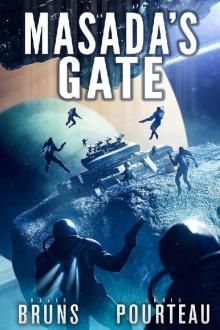 Masada's Gate
Masada's Gate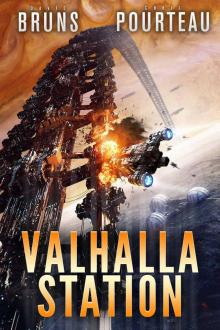 Valhalla Station
Valhalla Station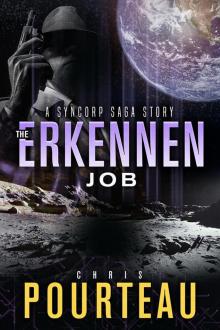 The Erkennen Job
The Erkennen Job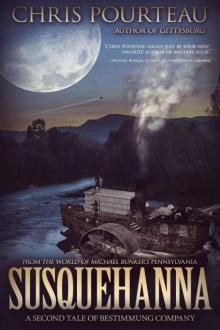 Susquehanna
Susquehanna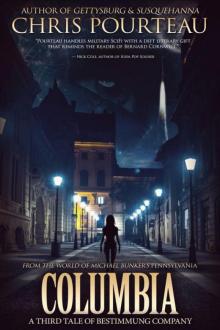 Columbia
Columbia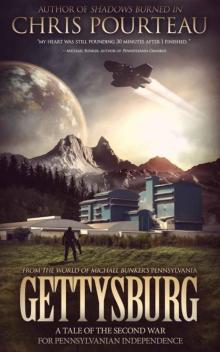 Gettysburg: A Tale of the Second War for Pennsylvanian Independence
Gettysburg: A Tale of the Second War for Pennsylvanian Independence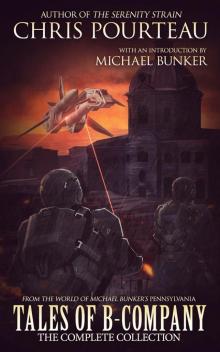 Tales of B-Company: The Complete Collection
Tales of B-Company: The Complete Collection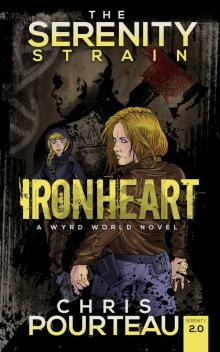 Ironheart (The Serenity Strain Book 2)
Ironheart (The Serenity Strain Book 2)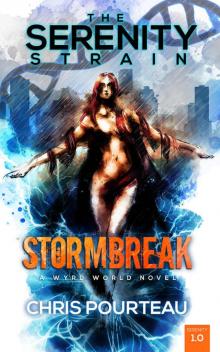 Stormbreak (The Serenity Strain Book 1)
Stormbreak (The Serenity Strain Book 1)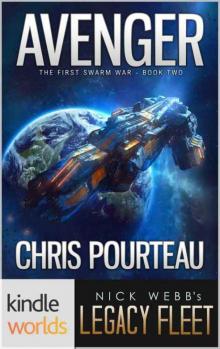 Legacy Fleet: Avenger (Kindle Worlds) (The First Swarm War Book 2)
Legacy Fleet: Avenger (Kindle Worlds) (The First Swarm War Book 2) Shadows Burned In
Shadows Burned In